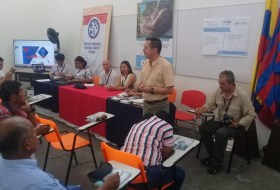News
Training in water and rural sanitation for populations affected by the armed conflict
Training is aimed at the protection of watersheds and the conservation of water resources with emphasis on moors by different entities, including the University of Cauca, in Santander de Quilichao.
With the participation of seventy people among officials from municipalities such as Santander de Quilichao, Corinto and Miranda, as well as representatives from different rural communities in northern Cauca, the Diploma in Sustainable Water Management and Rural Sanitation is carried out by the University of Cauca, the Swiss Cooperation for Development (Cosude) and the Pan American Development Foundation (Fupad).
According to the organizing entities, the purpose of the Diploma is to improve the living conditions of the rural populations affected by the armed conflict and to support the construction of a lasting peace at territorial level. This training will be carried out until March 20, 2020, with the development of topics of community interest such as drinking water, basic sanitation, peace, development and rurality, systems and technologies administration.
"Public institutions, private companies and research centers are working together to apply the water footprint, promote corporate water management strategies and establish a community of practice to positively influence water management in Colombia," said Javier Ernesto Fernández , professor of the Department of Environmental and Sanitary Engineering of the Faculty of Civil Engineering and coordinator of the diploma in Sustainable Management of Water and Rural Sanitation.
He added that participants are expected to recognize themselves from their context, because they work in drinking water and basic sanitation, but the sector must be identified very well and know what to do to improve community management, based on the knowledge acquired in the diploma that is not only about water, but in the community management of this vital resource.
Likewise, the course teaches to formulate projects to improve access to the precious liquid, the importance with respect to the quality of the water resource, the technologies that are managed for basic sanitation and drinking water so that communities are empowered by the theme and daily work in rural aqueducts. "These issues are part of the efforts of the Swiss Cooperation in promoting inclusive and sustainable economic development," said Inés Fernanda Caicedo, coordinator of the Swiss Operation for Development (Cosude) in the Pacific zone.
In this way, the University of Cauca is part of this type of activities related to community and community development, making presence to train particularly in the sustainability of water and rural sanitation services, critical aspects that not only concern Cauca but to the whole country.
More Info:
Center for Continuing, Open and Virtual Education, Cecav
Telephone: 8209800, Ext. 3203 - 3204
Email: cecav@unicauca.edu.co


